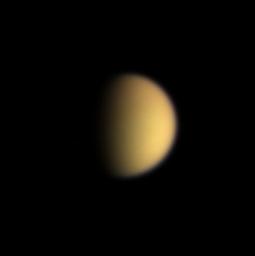
|
Titan in Natural Color
- Click the image above for a larger view
- Full-Res JPEG (446 x 448) (5.2 kB)
- Full-Res TIFF (446 x 448) (115.1 kB)
Caption:
Despite the views of the surface of Saturn's Titan moon provided by the Cassini spacecraft, the moon remains inscrutable to the human eye. Images taken with the narrow angle camera using red, green and blue color filters were combined to create this view.
In true-color images taken in visible wavelengths, Titan's photochemical smog, rich in organic material, gives the moon a smooth, featureless, orange glow.
The Cassini orbiter carries specially designed spectral filters that can pierce Titan's veil. Furthermore, its piggybacked Huygens probe will descend through the atmosphere in early 2005, giving an up-close-and-personal look at this mysterious orange moon.
The images making up this color view were obtained at a Sun-Titan-spacecraft, or phase, angle of 67 degrees, and from a distance of approximately 13.1 million kilometers (8.2 million miles) on June 10, 2004. The image scale is approximately 79 kilometers (49 miles) per pixel.
Background Info:
The Cassini-Huygens mission is a cooperative project of NASA, the European Space Agency and the Italian Space Agency. The Jet Propulsion Laboratory, a division of the California Institute of Technology in Pasadena, manages the Cassini-Huygens mission for NASA's Office of Space Science, Washington, D.C. The Cassini orbiter and its two onboard cameras, were designed, developed and assembled at JPL. The imaging team is based at the Space Science Institute, Boulder, Colo.
For more information, about the Cassini-Huygens mission visit, http://saturn.jpl.nasa.gov and the Cassini imaging team home page, http://ciclops.org .
Cataloging Keywords:
| Name | Value | Additional Values |
|---|---|---|
| Target | Titan | |
| System | Saturn | |
| Target Type | Satellite | |
| Mission | Cassini-Huygens | |
| Instrument Host | Cassini Orbiter | Huygens Probe |
| Host Type | Orbiter | Lander, Probe |
| Instrument | Imaging Science Subsystem (ISS) | |
| Detector | Narrow Angle Camera | |
| Extra Keywords | Atmosphere, Color, Visual | |
| Acquisition Date | ||
| Release Date | 2004-07-02 | |
| Date in Caption | 2004-06-10 | |
| Image Credit | NASA/JPL/Space Science Institute | |
| Source | photojournal.jpl.nasa.gov/catalog/PIA06081 | |
| Identifier | PIA06081 | |
